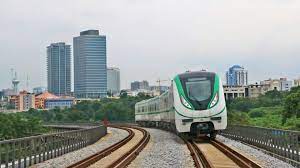Another P&ID joke looms as Ministry of Transport signs BOT MoU with lifeless UK firm to construct Calaba-PortHarcour-Abuja rail
Maureen Aguta
Indication at the weekend was that the Federal Government may have through the Federal Ministry of Transportation, entered into a Built, Own and Transfer (BOT) Memorandum of Understanding (MoU)agreement with a lifeless UK firm, Messrs MPH Rail Development Limited, that has unknown men from a section of Nigeria as its directors to build Port Harcourt-Enugu-Calaba-Abuja rail.
Moreso, in the two or three years of existence of the company on paper, there is no record of it having had anything to do with rail construction of railway infrastructure.
A Nigerian who was outraged over the ridiculous deal said: “Why are we like this in Nigeria? The company was incorporated on 26 September 2019 with a share capital of £100. It filed accounts in August 2021, June 2022, and April 2023 with the UK Companies House as a dormant company! It still only showed £100 share capital.
In May 2022, the UK Companies Registry filed a notice of compulsory dissolution but discontinued it a month later.
In October 2023, it increased its share capital to £1,000.
Then, in March 2024, it wins a BOT contract for the PH-Enugu-Calabar-Abuja rail line! Are we ever serious in this country? Haven’t we learned anything from P&ID? Not one person in that paper company’s board has ever been associated with construction talk less of a railway.
The Ministry of Transport has signed a Memorandum of Understanding with Messrs MPH Rail Development Limited, a United Kingdom company for the implementation of the Port Harcourt–Enugu–Calabar–Abuja Standard Gauge Rail Line project under a public-private partnership framework.”
Meanwhile the announcement for the consummation of the multi-billion dollars agreement was contained in a statement sighted on Friday by Advocacy Times on the Ministry Transportation’s website.
Under the MoU, the purported UK firm will manage the design, construction, commissioning, operation, and eventual transfer of the Port Harcourt–Enugu–Calabar–Abuja Standard Gauge Rail Line.
The ministry stated that the MoU signing followed the approval of the Outline Business Case and the issuance of a compliance certificate by the Infrastructure, Concession, and Regulatory Commission.
This clearance enables Messrs MPH Rail Development Limited to focus on compiling the necessary documentation for Federal Executive Council approval to advance the project.
The statement claimed that the MoU signing ceremony between the minister and the management of Messrs MPH Rail Development Limited was attended by the Permanent Secretary of the Ministry of Transportation, Olufemi Oloruntola, along with the Director of Rail Development, Zirra Fimbarr; and the Director of Legal Services, Pius Oteh.
The Minister of Transportation, Senator Said Alkali, assured all of the ministry’s support for the successful implementation of the project.
He emphasised the importance of diligent preparation and submission of all requisite documents to expedite FEC’s approval.
The statement read in part, “As part of the initiative to consolidate the ongoing railway modernisation projects consistent with the Renewed Hope Agenda of Presidential Bola Ahmed Tinubu’s administration, the Minister of Transportation, Senator Said Ahmed Alkali, has executed a Memorandum of Understanding on behalf of the Federal Ministry of Transportation with Messrs MPH Rail Development (UK) Limited to enable the company to carry out the design, construction, commissioning, operation and transfer of the Port Harcourt–Enugu–Calabar–Abuja Standard Gauge Rail Line on Public – Private Partnership basis.”
The ministry said vital documents required for the project’s progression include a comprehensive feasibility study report, a complete Business Case Study, an Environmental and Social Impact Assessment, the development of a Resettlement Action Plan, and the formulation of a Financial Model to facilitate project implementation.
This ensures that the project’s transfer to the Federal Government under a PPP arrangement without incurring loans or debts for the Nigerian government or its agencies.


